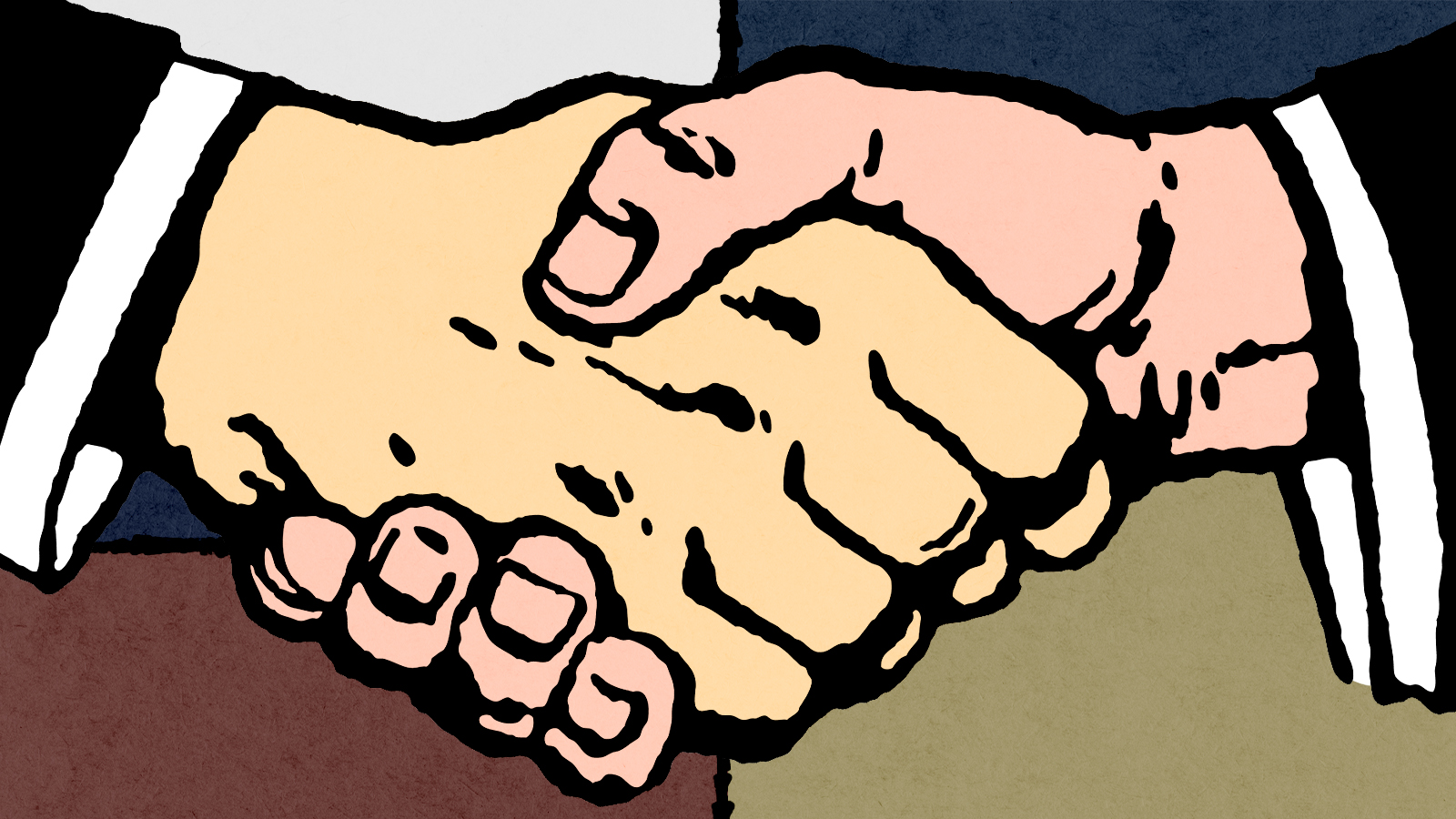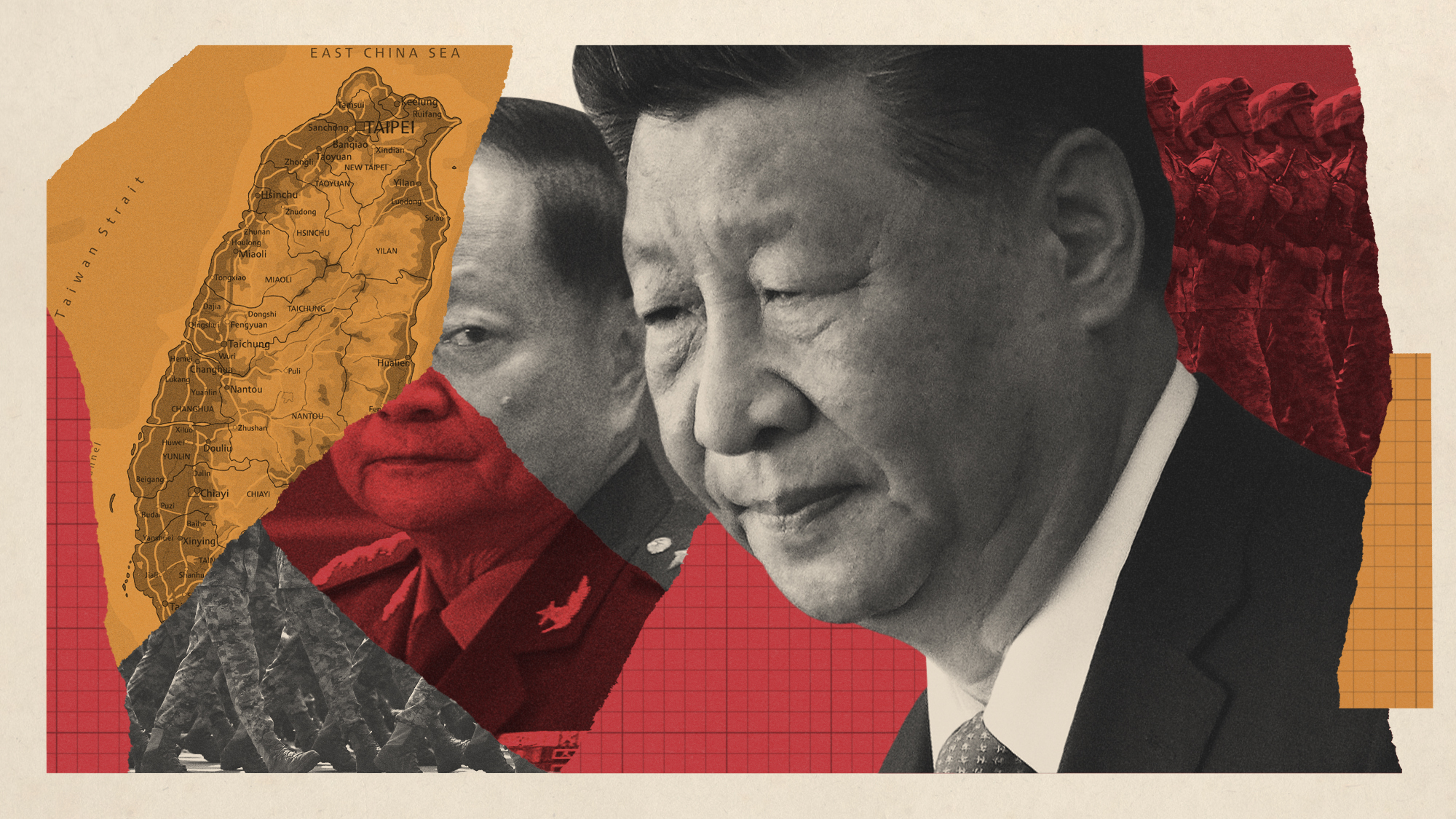Ukraine needs honest brokers
Good thing some key powers remain independent of both sides


A free daily email with the biggest news stories of the day – and the best features from TheWeek.com
You are now subscribed
Your newsletter sign-up was successful
When Naftali Bennett, Israel's prime minister, traveled to Moscow last weekend in an attempt to facilitate ceasefire talks between Russia and Ukraine, it attracted attention mostly because of what it meant for Israel and for Bennett himself. That was a reasonable emphasis: Bennett's political fortunes were shaky before the trip, and the novelty of Israel playing mediator rather than being a party to mediation really was the story.
But Bennett aside, mediators play an important role in conflict resolution, if only because they can offer a way for both parties to climb down from maximal demands without appearing to give in to pressure from the other side. Israel may already have done some good in that regard, though it was really little more than a go-between: Israeli officials reported a softening of both sides' positions, with Russia backing away from demanding regime change and demilitarization of the country as a whole and Ukraine showing openness to neutrality rather than NATO membership.
No one would sensibly give odds on a breakthrough at this point. Russia may not be negotiating in good faith, and a breakdown in negotiations could easily lead to a much more brutal war. But it would be equally foolish not to give peace a chance.
The Week
Escape your echo chamber. Get the facts behind the news, plus analysis from multiple perspectives.

Sign up for The Week's Free Newsletters
From our morning news briefing to a weekly Good News Newsletter, get the best of The Week delivered directly to your inbox.
From our morning news briefing to a weekly Good News Newsletter, get the best of The Week delivered directly to your inbox.
Getting there, though, will likely require more than a go-between. It needs an honest broker to bring both sides to the table — and keep them there until a viable deal is reached. To play that role, a mediating country must be perceived as genuinely independent from both sides in the conflict. It must also have sufficient clout on the world stage to be able to offer something to both sides if they do come to agreement. Israel passes the first test, but not the second. Who else is there?
Historically, the country which often aspired to that role was the United States. President Theodore Roosevelt helped midwife the Treaty of Portsmouth of 1905 that ended the Russo-Japanese War; President Jimmy Carter mediated the Camp David Accords between Israel and Egypt; and President Bill Clinton helped bring about the Oslo Accords between Israel and the PLO and the peace agreement between Israel and Jordan.
In the current conflict between Ukraine and Russia, however, America cannot possibly play mediator. We are seen unequivocally as a party to the conflict — indeed, before the war, Russia saw America as the only important party to the conflict, with Ukraine and our European allies being largely dismissed. The latter part of that calculation has been altered dramatically by brave Ukrainian resistance and surprising European unity. The former has not.
Meanwhile, that European unity has also meaningfully reduced the sphere of neutrality, with Switzerland joining the sanctions regime and Sweden and Finland talking about joining NATO. If some power is going to broker a peace, it will have to come from the ranks of those less committed to the Ukrainian cause.
A free daily email with the biggest news stories of the day – and the best features from TheWeek.com
It is fortunate, from this perspective, that global unity behind Ukraine has been greatly exaggerated. Turkey, for example, notwithstanding being a NATO ally, has long tried to maintain working relationships with both Russia and Ukraine. It has charted a middle course in the current conflict, calling it a war and therefore closing the Bosporus, but also declining to join in Western sanctions. Brazil is another mid-sized power that has condemned Russia's invasion but also expressed pointed criticism of the sanctions regime.
Then there are the two Asian giants: China and India. China is increasingly viewed as a Russian ally — indeed, the senior partner in their relationship. But the invasion of Ukraine, clearly violating Ukraine's sovereignty and galvanizing Western unity, has put Beijing in an extremely awkward position. It has so far played the role of passive observer, but its power and position gives Chinese leaders the opportunity to do much more.
India, meanwhile, is a traditional Russian ally, and has been fairly supportive of Russia in its current conflict. Outright support, however, might put strain on India's growing relationship with the United States in containing China. Both Asian powers have considerable leverage with Moscow and substantial carrots to offer Kyiv that either — or both — might deploy if they wanted to play a constructive role and thereby enhance their global stature.
How would Washington react to such a move? Would we be willing to see Beijing or New Delhi broker a peace that left Putin in power, with modest gains to claim for his misbegotten war? Would we, particularly, be prepared to endorse such a deal by unwinding the extraordinary sanctions regime in response?
It's hard to know. Any compromise would have to enable Putin to claim — however implausibly — some kind of policy victory as the fruit of his war. That could be a domestic political liability for any American leader to accept. Meanwhile, a long war that badly weakened Russia and required no compromise with aggression might suit a lot of American policymakers just fine, particularly if it led to a sustained European commitment to higher defense spending.
On the other hand, that's an outcome that would be devastating for Ukraine and its people. In that sense, Western — particularly American — and Ukrainian interests are not perfectly aligned. If a peace deal foundered over a refusal to unwind sanctions, other vulnerable countries would see new risks in aligning unequivocally with the West. We'd risk isolating ourselves as much as we did Russia if the rest of the world evolves to avoid being caught in a similar web of sanctions in the future.
If we actually want to resolve the conflict, and signal that desire to both Ukraine and Russia and to third parties, we need to decide now what the purpose of the sanctions regime is. If it is to end a war of aggression, then an end to that aggression should end the sanctions — even if that resolution is on terms not entirely to our liking. They can't be sustained indefinitely in an effort to undermine the Russian regime.
And regardless of our aims, we need to recognize that our commitment to maximum pressure, even without resort to military intervention, hasn't divided the world into two camps. Much of the world still stands in between — and it is the powers in between who have the best opportunity to help resolve the conflict. Let's hope they see how much they have to gain from stepping up.
Noah Millman is a screenwriter and filmmaker, a political columnist and a critic. From 2012 through 2017 he was a senior editor and featured blogger at The American Conservative. His work has also appeared in The New York Times Book Review, Politico, USA Today, The New Republic, The Weekly Standard, Foreign Policy, Modern Age, First Things, and the Jewish Review of Books, among other publications. Noah lives in Brooklyn with his wife and son.
-
 Why is the Trump administration talking about ‘Western civilization’?
Why is the Trump administration talking about ‘Western civilization’?Talking Points Rubio says Europe, US bonded by religion and ancestry
-
 Quentin Deranque: a student’s death energizes the French far right
Quentin Deranque: a student’s death energizes the French far rightIN THE SPOTLIGHT Reactions to the violent killing of an ultraconservative activist offer a glimpse at the culture wars roiling France ahead of next year’s elections.
-
 Secured vs. unsecured loans: how do they differ and which is better?
Secured vs. unsecured loans: how do they differ and which is better?the explainer They are distinguished by the level of risk and the inclusion of collateral
-
 ‘The forces he united still shape the Democratic Party’
‘The forces he united still shape the Democratic Party’Instant Opinion Opinion, comment and editorials of the day
-
 The UK expands its Hong Kong visa scheme
The UK expands its Hong Kong visa schemeThe Explainer Around 26,000 additional arrivals expected in the UK as government widens eligibility in response to crackdown on rights in former colony
-
 ‘Hong Kong is stable because it has been muzzled’
‘Hong Kong is stable because it has been muzzled’Instant Opinion Opinion, comment and editorials of the day
-
 What do Xi’s military purges mean for Taiwan?
What do Xi’s military purges mean for Taiwan?Today’s Big Question Analysts say China’s leader is still focused on reunification
-
 What is at stake for Starmer in China?
What is at stake for Starmer in China?Today’s Big Question The British PM will have to ‘play it tough’ to achieve ‘substantive’ outcomes, while China looks to draw Britain away from US influence
-
 ‘It’s good for the animals, their humans — and the veterinarians themselves’
‘It’s good for the animals, their humans — and the veterinarians themselves’Instant Opinion Opinion, comment and editorials of the day
-
 The billionaires’ wealth tax: a catastrophe for California?
The billionaires’ wealth tax: a catastrophe for California?Talking Point Peter Thiel and Larry Page preparing to change state residency
-
 What is China doing in Latin America?
What is China doing in Latin America?Today’s Big Question Beijing offers itself as an alternative to US dominance
